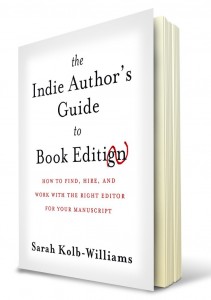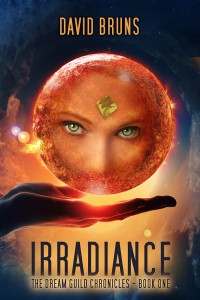Tag Archives for " Sarah Kolb-Williams "
My editor published a book… and I get to review it!
 If you’re a beginning indie author, you've seen this face in the mirror. It's you, manuscript clutched in your sweaty hands, facing a mind-paralyzing barrage of questions on the next step in your publishing journey–editing. Do I need a professional editor? How do I find one? What kind of edit do I need? How much is it going to cost me? And, my favorite, how do I make sure I don’t get ripped off?
If you’re a beginning indie author, you've seen this face in the mirror. It's you, manuscript clutched in your sweaty hands, facing a mind-paralyzing barrage of questions on the next step in your publishing journey–editing. Do I need a professional editor? How do I find one? What kind of edit do I need? How much is it going to cost me? And, my favorite, how do I make sure I don’t get ripped off?
Like many indies, I stumbled through the editing of my first book, The Dream Guild, using a combination of friends, professionals and good, old-fashioned careful re-re-re-reading to pound my manuscript into shape. By the time I finally called it done, I was reciting passages in my sleep (and not the good passages, either).
It was painful and not fun at all, but the book did get edited. Still, when I decided to do this writing gig full-time, I knew I needed professional editing help. I asked some writing friends for recommendations, did some Internet sleuthing and came up with a short list. Then I interviewed both of them. In person. (For some reason, proximity was a search criteria. What can I say? I’m old school.)
 That’s how I met Sarah Kolb-Williams, professional editor and author of The Indie Author’s Guide to Book Editing. I’ve since worked with Sarah as my editor on three writing projects. I’m sad to say that when we first met, she was still writing her wonderful how-to book on editing. In hindsight, this was exactly the kind of resource I wished I’d had in my search for an editorial partner.
That’s how I met Sarah Kolb-Williams, professional editor and author of The Indie Author’s Guide to Book Editing. I’ve since worked with Sarah as my editor on three writing projects. I’m sad to say that when we first met, she was still writing her wonderful how-to book on editing. In hindsight, this was exactly the kind of resource I wished I’d had in my search for an editorial partner.
The Indie Author’s Guide is aimed at the beginner, the first-timer, the guy or gal who <say it with me in a stern voice> must have a professional editor. Then, in the same breath, those stern voices say: “It’s a jungle out there! Don’t get ripped off!”
What’s a newbie to do?
Here's your game plan: Tomorrow morning, skip the latte at Starbucks and invest those dollars in Sarah’s book. Let her lead you step-by-step through the basics of the editing game, so you, dear neophyte, are armed with knowledge (and do not get ripped off).
Lest you think editing is a dry topic, I can vouch for her sense of humor. Consider her explanation of why we spell out numbers in the text of a book as opposed to using numerical digits: “The spelled-out numbers look like they belong in the sentence, while the digits stand out like a Wookiee at a nude beach.” C'mon, is there ever an inappropriate moment for Star Wars humor?
 My own experience of working with a pro was (and still is) a good one. I’ve heard stories of how writers dread getting their manuscripts back from their editors and seeing all the mark-ups. That’s not how I felt at all. When the edited version of Irradiance showed up in my inbox, I was excited. To me, it was such a relief to look at passages I had wrestled over long and hard and say: “YES! That’s what I was trying to say!”
My own experience of working with a pro was (and still is) a good one. I’ve heard stories of how writers dread getting their manuscripts back from their editors and seeing all the mark-ups. That’s not how I felt at all. When the edited version of Irradiance showed up in my inbox, I was excited. To me, it was such a relief to look at passages I had wrestled over long and hard and say: “YES! That’s what I was trying to say!”
That’s what a good editor can do for you.
But there are larger issues at play here. A few weeks ago, I ran across a post from Bookworm Kingdom entitled, Self-Published Authors: Please Stop Making Us All Look Bad. Her point was simple: self-publishing is a fabulous development for the industry, but self-published authors putting out poorly edited work is the professional equivalent of peeing in the publishing pool. We all swim in the same water…you get the idea.
But I think maybe this blogger didn’t take her argument far enough. Despite the nose-holding disdain from the ivory towers of traditional publishing, the indie writing barbarians are moving across the readership map, rewriting borders and changing the very meaning of the term publisher. The Indie Author’s Guide cites James Altucher: “The distinction now is no longer between ‘traditional publishing’ versus ‘self-publishing.’ The distinction now is between professional versus unprofessional publishing.”
Even Altucher doesn’t go far enough, in my opinion. As a reader, the book publisher is no longer a relevant factor in my book consumption process; what I care about is the book author. Independent means that you are in control, you call your own shots. If someone picks up your book and it’s not a high quality piece of work, it’s on you, not your publisher. The question is not: can I afford a professional editor? The question you need to ask yourself is: can I afford not to have a professional editor?
If you’re new to independent authorship, do yourself a favor. Spend a few shekels to get your copy of The Indie Author’s Guide to Book Editing. Read it all the way through and follow Sarah’s advice. She knows what she’s talking about.
Disclaimers:
- Sarah is my editor. I pay her money to pound my keyboard drivel into a readable form that people will buy.
- In case you didn’t catch it above, I love my editor. I highly recommend her to any sci-fi writers who might be in the market for professional editing assistance, but I warn you: if you take my editing slot on her calendar, I will hunt you down.
- I received a copy of this book free of charge.
- This review is fair and honest. Sarah did not employ Jedi mind-tricks on me….but, then again, if she did, I wouldn’t know it, would I?
- I did not send this post to my editor before I published it; therefore, any mistakes are mine.
David Bruns is the creator of the sci-fi series The Dream Guild Chronicles, and one half of the Two Navy Guys and a Novel blog series about co-writing the military thriller, Weapons of Mass Deception. Check out his website for a free sample of his work.

